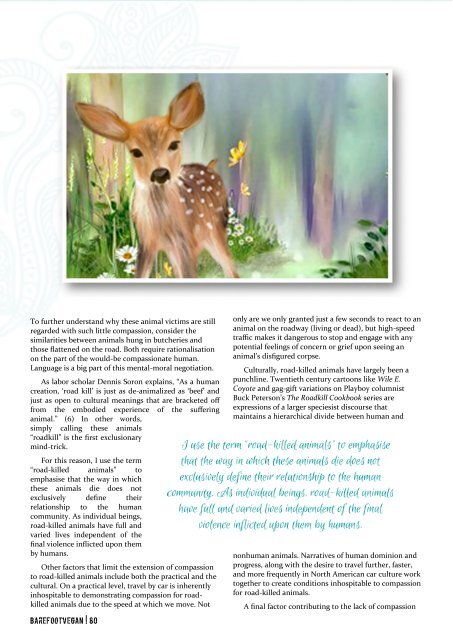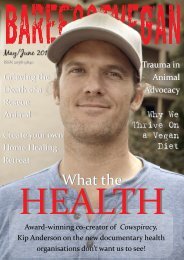Barefoot Vegan Mag Jan_Feb 2017
You also want an ePaper? Increase the reach of your titles
YUMPU automatically turns print PDFs into web optimized ePapers that Google loves.
To further understand why these animal victims are still<br />
regarded with such little compassion, consider the<br />
similarities between animals hung in butcheries and<br />
those flattened on the road. Both require rationalisation<br />
on the part of the would-be compassionate human.<br />
Language is a big part of this mental-moral negotiation.<br />
As labor scholar Dennis Soron explains, “As a human<br />
creation, ‘road kill’ is just as de-animalized as ‘beef’ and<br />
just as open to cultural meanings that are bracketed off<br />
from the embodied experience of the suffering<br />
animal.” (6) In other words,<br />
simply calling these animals<br />
“roadkill” is the first exclusionary<br />
mind-trick.<br />
For this reason, I use the term<br />
“road-killed animals” to<br />
emphasise that the way in which<br />
these animals die does not<br />
exclusively define their<br />
relationship to the human<br />
community. As individual beings,<br />
road-killed animals have full and<br />
varied lives independent of the<br />
final violence inflicted upon them<br />
by humans.<br />
Other factors that limit the extension of compassion<br />
to road-killed animals include both the practical and the<br />
cultural. On a practical level, travel by car is inherently<br />
inhospitable to demonstrating compassion for roadkilled<br />
animals due to the speed at which we move. Not<br />
only are we only granted just a few seconds to react to an<br />
animal on the roadway (living or dead), but high-speed<br />
traffic makes it dangerous to stop and engage with any<br />
potential feelings of concern or grief upon seeing an<br />
animal’s disfigured corpse.<br />
Culturally, road-killed animals have largely been a<br />
punchline. Twentieth century cartoons like Wile E.<br />
Coyote and gag-gift variations on Playboy columnist<br />
Buck Peterson’s The Roadkill Cookbook series are<br />
expressions of a larger speciesist discourse that<br />
maintains a hierarchical divide between human and<br />
nonhuman animals. Narratives of human dominion and<br />
progress, along with the desire to travel further, faster,<br />
and more frequently in North American car culture work<br />
together to create conditions inhospitable to compassion<br />
for road-killed animals.<br />
A final factor contributing to the lack of compassion<br />
BAREFOOT<strong>Vegan</strong> | 80





